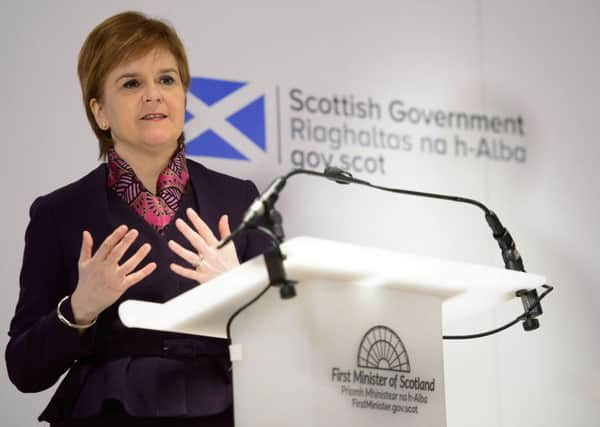Leader comment: Sturgeon is right about Scotland's Brexit problem


However, the Prime Minister needs to wake up to the particular problems facing Scotland, which could prove as serious as the wrangles over hard and soft borders and where to put them.
Nicola Sturgeon yesterday warned that Scotland was facing a stark future of depopulation and economic decline, particularly if the outcome of the UK’s negotiations with Brussels is a ‘hard Brexit’. Also yesterday, after meeting with Ms May, Scottish Tory leader Ruth Davidson revealed she was “frustrated” by the UK Government’s lack of progress on setting out which EU laws will be transferred to Holyrood’s control, although she stressed it was “all very technical and complicated stuff”.
Advertisement
Hide AdAdvertisement
Hide AdAt present, some 111 issues will be retained by Westminster in what the SNP has dubbed a “power grab”, although Scottish Secretary David Mundell has pledged there will be further amendments to the EU Withdrawal Bill to devolve at least some of the powers in question.
It might be easy for Ms May to dismiss the SNP’s claims as little more than party politics, attempting to further spin Brexit into an argument for independence. But when her own Conservative MPs are singing from a similar hymn sheet, she would do well to listen.
Ms Sturgeon’s remarks on immigration also risk being treated as empty rhetoric by the Prime Minister, but that would be a mistake.
Scotland’s population is projected to fall if the supply of migrants is curtailed and fewer people paying taxes means less money for services that, for example, look after the growing number of elderly people.
Most experts predict the British economy as a whole will take a hit as a result of our departure from the EU, but if the blow to Scotland is noticeably harder some may start to question this country’s membership of the UK.
For those who wish to keep the Union together, this is a prospect that must be avoided.
For those campaigning for independence, it is an opportunity, but also a threat. Scotland voted strongly to remain in the EU so may be understandably annoyed if it is plunged into a recession after a Brexit it did not want.
But an economy in ruins, or close to it, is hardly a good starting point for any new nation.
